#Earl Blumenauer
Text
Excerpt:
With the help of three Democratic members, the Republican-controlled House Budget Committee on Thursday advanced legislation to establish a fiscal commission that critics say is a trojan horse for Social Security and Medicare cuts.
The final vote to send the bill to the full House was 22-12, with Reps. Earl Blumenauer (D-Ore.), Scott Peters (D-Calif.), and Jimmy Panetta (D-Calif.) joining every present Republican in supporting the Fiscal Commission Act.
#u.s. house of representatives#social security#medicare#republicans#scott peters#jimmy panetta#earl blumenauer
6 notes
·
View notes
Text

Congressman Blumenauer Is Bicycling’s Biggest Advocate
0 notes
Text
NORML: U.S. Congress: Legislation Introduced To Get The Feds Out of The Marijuana Enforcement Business
Source:NORML
Representative Jared Polis has been against the War on Drugs and in favor of marijuana legalization as long as I’ve known of him and I believe he was elected to the House in 2007. And has worked with Ethan Nadelman and other anti-drug war groups in Colorado the state he represents and other places. So Representative Polis is not a Johnny-come-lately to marijuana legalization. Someone…
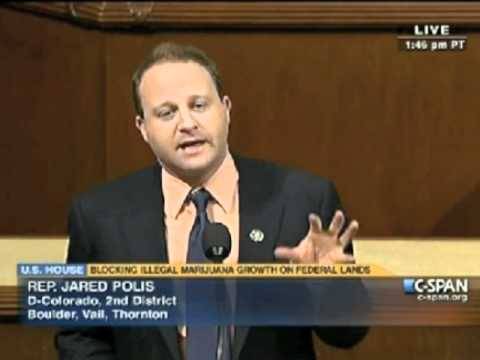
View On WordPress
#114th Congress#2015#America#American Drug War#Cannabis#Center Right#Classical Liberalism#Classical Liberals#Colorado#Controlled Substance Act#Democratic Party#Drug War#Earl Blumenauer#House Democrats#Jared Polis#Liberalism#Liberals#Marijuana#Marijuana Legalization#Pot#U.S. Congress#U.S. Government#U.S. House of Representatives#United States#Washington#Washington DC
0 notes
Text
As the federal government struggles to recruit young people, a recent survey found that 30% of those between the ages of 18 and 30 have either declined to apply or withdrawn applications for jobs because of strict marijuana policies required for security clearances.
The poll, published on the unofficial marijuana holiday April 20 by ClearanceJobs and the Intelligence and National Security Foundation (INSF), interviewed young adults about federal employment policies, focusing on cannabis.
Participants were first asked whether they’d consider working in a federal position that requires security clearance, and almost 80% said they either would or might consider applying; 40% also said that they’ve used marijuana in the past year.
One of the most notable findings is that 20% of participants said they’ve declined to apply for federal jobs because of the government’s restrictive cannabis policies. Another 10% said they’ve withdrawn applications because of the marijuana rules.
The survey also found that 25% said the government’s marijuana policy would prevent them from seeking employment requiring a security clearance in the future. While 39% said they’d be willing to abstain from cannabis in order to secure a federal job, 18% said they wouldn’t. And 15% said that they wouldn’t stop using marijuana after getting a security clearance.
Interestingly, most of the panel didn’t have a firm grasp on what the government’s cannabis policy actually is. 16% said that any marijuana use automatically disqualifies applicants for security clearance, 37% said there’s no eligibility impact, 24% said it is one of several factors that are considered for clearance, and 23% said they didn’t know.
Similarly, there’s confusion about the policies for people who’ve already obtained security clearances, with 9% saying those individuals can use marijuana anywhere, 31% saying they can use in a legal jurisdiction, 33% saying cannabis use is prohibited, and 26% saying they didn’t know.
Only 4% of participants correctly answered both questions about what the federal government’s security clearance rules are for applicants and those who are already cleared.
The survey involved interviews with 905 adults aged 18-30 living in Virginia, Maryland, the District of Columbia, California, Florida, Texas and Colorado. The interviews took place in February. The margin of error is +/- 3.23 percentage points.
While marijuana employment policies under federal prohibition remain strict, various agencies have moved to loosen requirements as more states have enacted legalization.
For example, the United States Secret Service recently updated its employment policy to be more accommodating to applicants who’ve previously used marijuana, making it so candidates of any age become eligible one year after they last consumed cannabis. Previously, there were stricter age-based restrictions.
The federal Bureau of Alcohol, Tobacco, Firearms and Explosives (ATF) has also revised its cannabis rules for job applicants. Applicants who’ve grown, manufactured or sold marijuana in compliance with state laws while serving in a “position of public responsibility” will no longer be automatically disqualified.
Late last year, draft documents obtained by Marijuana Moment showed that the federal Office of Personnel Management was proposing to replace a series of job application forms for prospective workers in a way that would treat past cannabis use much more leniently than under current policy.
The Biden administration instituted a policy in 2021 authorizing waivers to be granted to certain workers who disclose prior marijuana use, but some lawmakers have pushed for additional reform.
For example, Rep. Jamie Raskin (D-MD) said at a congressional hearing on marijuana legalization last year that he intended to file a bill aimed at protecting federal workers from being denied security clearances over marijuana.
Last year, the nation’s largest union representing federal employees adopted a resolution supporting marijuana legalization and calling for an end to policies that penalize federal workers who use cannabis responsibly while they’re off the clock in states where it is legal.
The Director of National Intelligence said in 2021 that federal employers shouldn’t outright reject security clearance applicants over past use, and should use discretion when it comes to those with cannabis investments in their stock portfolios.
The FBI also updated its hiring policies that year to make it so candidates are only automatically disqualified from joining the agency if they disclose having used marijuana within one year of applying. Previously, prospective employees could not have used cannabis within the past three years.
The Department of Transportation (DOT) also took a different approach to its cannabis policy in 2020, stating in a notice that it would not be testing drivers for CBD. However, DOT has more recently reiterated that the workforce it regulates is prohibited from using marijuana and will continue to be tested for THC, regardless of state cannabis policy.
Rep. Earl Blumenauer (D-OR) sent a letter to the head of DOT last year, stating that the agency’s policies on drug testing truckers and other commercial drivers for marijuana are unnecessarily costing people their jobs and contributing to supply chain issues.
The Environmental Protection Agency (EPA) also emphasized to its workers that they are prohibited from using marijuana—or directly investing in the industry—no matter the state law or changes in “social norms” around cannabis.
While the Biden administration did institute its waiver policy, it came under fire from advocates following reports that the White House fired or otherwise punished dozens of staffers who were honest about their history with marijuana.
Then-White House Press Secretary Jen Psaki attempted to minimize the fallout, without much success, and her office released a statement in 2021 saying that nobody was fired for “marijuana usage from years ago,” nor terminated “due to casual or infrequent use during the prior 12 months.”
#us politics#news#filter#marijuana#legalize marijuana#cannabis#legalize cannabis#decriminalization#2023#ClearanceJobs#Intelligence and National Security Foundation#biden administration#United States Secret Service#Bureau of Alcohol Tobacco Firearms and Explosives#Office of Personnel Management#rep. jamie raskin#rep. Earl Blumenauer#Department of Transportation#director of national intelligence#fbi#Environmental Protection Agency#Jen Psaki
15 notes
·
View notes
Text
god but watching all the ascension stuff w/ramza last night has me so insane about xarrastarion. because like the thing is he never really Stops wanting to manipulate them up until the ritual happens (there is some nuance to what’s happening After that if i get into now i’ll get nothing done at work today at all lol) but just instead of “how can i keep myself safe” it’s “how can i keep them mine” and it’s not about possessiveness (deeply not a thing for the two of them) it’s about well. that one fucking line after you ascend him. “he will always see you as degrading yourself if you continue to be with him.” and it’s not about being insecure or whatever like idk it would be very easy to woobify him here and to be like “poor baby is insecure and sad etc etc etc” and yeah there’s an element here of like. feeling unworthy or whatever. but he’s not really wallowing in that? it’s not the tear filled “why would you ever love someone like me :((((((“ conversations i think people want to see with characters like this it’s very much like. i’m going to do everything i can to Make you love me. i know you said you care for me but the clock is ticking and eventually my burdens will be too much to bear and i have to make the value proposition of my being in your life sound appealing despite all that. he feels that way regardless, but once you get to the ritual the difference between ascended and spawn endings is that for ascended it’s “maybe you like degrading yourself” and spawn recognizes that they don’t see it as degrading at all.
and i think with xarrai specifically like. he believes they care for him. he believes they intend to help him kill cazador come hell or high water. but he also believes them to be someone who is calculating and always aware of the cost and benefit of keeping people around (whether he’s 100% right about that is a different story tho) and so he feels like. idk. the stakes feel high no matter how honestly they try to show him they care for him and need and want nothing else from him. i feel like that line after the spawn ambush that’s like “i’m doing this for you too, you know. to make sure we’re both safe.” is exactly the heart of it - it’s a very valid interpretation to say that’s more manipulation and is entirely a lie but i think there’s something compelling in seeing it as true. manipulative to an extent, but true. xarrai could tell him honestly and plainly that they absolutely want nothing more than his companionship and he would Still be trying to find a way to keep them his because i think the idea of losing what they have, of losing whatever “something real” means is like. unthinkable. and drives him to consider ascension the only option because it would allow him to keep hold of the things he wants and loves; power, sunlight, and them.
#had a whole conversation with a united states congressman in the middle of writing this post btw#shoutouts to earl blumenauer i guess#ANYWAY this is rambly and all over the place but i’m like. so so so compelled by like#idk. neither of them know what something real is.#but as long as power is on the table it is an Option and it’s not until xarrai lays out plainly what they know he’s thinking#that astarion recognizes that making them his spawn would. not be something real.#but there are 100% other factors and also by the time they’re talking about it it is Very late in the game for him to change his mind#IDK i think the manipulation that continues to happen even After he decides to stop manipulating them is soooo interesting#because like. he doesn’t know how to do anything without manipulation#and like. well. he can’t be certain they’re not still manipulating him.#he’s in love with them and he trusts them but he also knows. because they are mirrors of one another. that they’re still a manipulator#how can either of them ever be anything else?#i like them. is thing.#and do not want to be working rn#i need to put my phone away before mr congressman comes back goodbye#漫言#oc. xarrai#r. hold me like a knife
2 notes
·
View notes
Text
My Pedalpalooza 2022 report, as we are in the final month
My Pedalpalooza 2022 report, as we are in the final month
It’s the final month of Pedalpalooza, Portland’s summer-long bicycle fun fest. Last time we checked in I had went on the Kickoff Ride on June 1st, Tom Howe’s Know Your Greenways Ride on June 8, and then the first two rides I have led: Sunset/Moonrise and the Gorge Ride.
Since that report on June 27, I have led three more rides, each with their own report:
The Bikes and Film Cameras Club Ride on…

View On WordPress
#earl blumenauer bridge#i shoot film ride 28 june 2022#pedalpalooza#pedalpalooza 2022#technically singletrack
2 notes
·
View notes
Text
As He Exits Congress, Blumenauer Wants His Party to Embrace Pot Legalization
The long-serving congressman from Portland, who has become the top marijuana advocate on Capitol Hill, believes the issue could boost President Biden’s support with young voters.
As a 23-year-old serving his first term in the Oregon state legislature, Representative Earl Blumenauer cosponsored the first bill in the country to decriminalize small amounts of marijuana.
More than 50 years later, the…

View On WordPress
0 notes
Text
At the heart of Blumenauer’s bill is farm subsidy reform. In the most recent iteration of the farm bill, approximately $63bn was dedicated to subsidies. These mostly benefited the largest farms and agribusinesses, with 70% of subsidy payments going to just 10% of farms, most of which produce commodity crops like soy, corn and wheat, which are often used to make animal feed, processed foods and even fuel for cars.
This means that taxpayers are subsidizing processed food, but not the fruits and vegetables you buy in the grocery store – and that commodity farms have little incentive to switch to more sustainable modes of production or more nutritious foods that people will actually eat.
“Most of us don’t even know that the public dollars initially designed to protect farmers and keep supply managed to feed a hungry nation in the Great Depression are now reinforcing wealthy agribusiness corporations to grow commodities that are not even meant for human consumption,” said Joshua Sewell, a policy analyst at the nonpartisan watchdog group Taxpayers for Common Sense.
Farmers that grow what are called “specialty crops”, which include fruits and vegetables, usually don’t qualify for subsidies. Most of the farms excluded from subsidy payments are those using sustainable growing methods that preserve soil and benefit the climate in the long term.
“It’s just maddening to me that the men and women who are working hard producing food, and particularly those that are doing so in a sustainable fashion, or who want to be involved with organics, they’re shortchanged,” Blumenauer said.
473 notes
·
View notes
Text

𝗧𝗵𝗲 𝟯𝟵 𝗟𝗮𝘄𝗺𝗮𝗸𝗲𝗿𝘀 𝗟𝗲𝗮𝘃𝗶𝗻𝗴 𝗖𝗼𝗻𝗴𝗿𝗲𝘀𝘀 𝗜𝗻 𝟮𝟬𝟮𝟰 (𝗧𝘄𝗶𝗰𝗲 𝗔𝘀 𝗠𝗮𝗻𝘆 𝗗𝗲𝗺𝗼𝗰𝗿𝗮𝘁𝘀 𝗔𝘀 𝗥𝗲𝗽𝘂𝗯𝗹𝗶𝗰𝗮𝗻𝘀)
1. Ruben Gallego
2. Debbie Lesko
3. Tony Cardenas
4. Anna Eshoo
5. Barbara Lee
6. Grace F. Napolitano
7. Katie Porter
8. Adam Schiff
9. Ken Buck
10. Lisa Blunt Rochester
11. Jim Banks
12. Victoria Spartz
13. John Sarbanes
14. David Trone
15. Dan Kildee
16. Elissa Slotkin
17. Dean Phillips
18. Andy Kim
19. Brian Higgins
20. George Santos
21. Dan Bishop
22. Jeff Jackson
23. Bill Johnson
24. Brad Wenstrup
25. Earl Blumenauer
26. Colin Allred
27. Michael C. Burgess
28. Kay Granger
29. Sheila Jackson Lee
30. Abigail Spanberger
31. Jennifer Wexton
32. Derek Kilmer
33. Alex Mooney
34. Joe Manchin
35. Tom Carper
36. Mike Braun
37. Ben Cardin
38. Mitt Romney
39. Debbie Stabenow
- Ezra A. Cohen
#pay attention#educate yourselves#educate yourself#knowledge is power#reeducate yourself#reeducate yourselves#think about it#think for yourselves#think for yourself#do your homework#do some research#do your own research#ask yourself questions#question everything#news
51 notes
·
View notes
Text










A zine written by a radical, disabled/ neurodivergent, queer of Portland Oregon, with contributions from other disabled, queer artists and advocates as possible
A note:
Thank you to Canva and their artists for creating accessible and beautiful zine templates and graphic elements! And thank you to everyone who continues to put in the effort to fight against oppression. This is for you, especially those of you in the Portland Oregon disability/neurodivergent, and queer communities. And, of course, this is in honor and memory and to rally increased support around our fellow Palestinian humans.
Please let me know if you or anyone you know falls into the communities in Oregon/Portland that this zine is published for and want to contribute! Feel free to share without credit, although I did post originally from my personal and professional accounts; it is more for social activism :) Please reach out if you have any interest in supplying art of any kind.
-Creator and editor
*Please note times for White House Call Line are in Pacific Standard Time”
Alt text:
First slide:
Picture of pink dried flower with stem with pink and green sequins on cream background, cover of “Radical Justice”: A zine written by a radical disabled/neurodivergent, queer of Portland; with contributions from other disabled, queer artists and advocates. Published
November 2023, Palestinian Aid Issue
Second slide: Text reads: “We acknowledge the First Nations people who are the custodians of the land on which this zine is published and contributed from:
Cayuse, Umatilla and Walla Walla
Stl’pulmsh (Cowlitz)
Clackamas
Confederated Tribes of Grand Ronde
Confederated Tribes of Siletz Indians
We also thank our QTBIPOC members who have taken up disability and queer justice and care work before us and the groundwork they have laid and the rights they died for that we continue today as a community.” Text on cream background with three dried yellow and white varied flowers on too and three on bottom.
Third slide: Text reads: “To our Palestinian brothers,sisters, and gender diverse humans: we stand with you, always.” With a heart in the middle of the broken up words and surrounded by 6 varied dried flowers and leaves.
Fourth slide: A note on decolonization
We all benefit from enhancing and adding to the voices that call for decolonization and human rights.
Disabled/Neurodivergent and Queer communities especially, and ALL OF US benefit from doing what we can to fight oppression when we see it. Picture above on a swing with locks on it.
Fifth slide: Graphic reads “Where there is oppression, there will be resistance.” graphic by Poonam Whabi.
Below, an advertisement for a course called “Economics for Emancipation: A course on Capitalism, Solidarity, and How we get free”
Sixth slide:
Another picture of a Palestinian, masculine presenting child holding a sign with “Save Palestine” on it.
Google doc with resources on how to get more involved and resources for learning at https://bitly.ws/Y4ki.
Charities:
Medical Aid for Palestinians
Palestine Children’s Relief Fund
Medical Aid Pal
Podcast episodes:
Palestine Parts 1 & 2 with Sumatra Awad (author of “Palestine: A Socialist Introduction” by Upstream Podcast
Seventh slide: Picture of a pink flower with yellow inner seeds, under which the text reads: “A list of companies you should boycott that are funding Israel from BDS Movement.net
https://BDSmovement.net (more info about the differences here)”
Please see list from graphic below at this site as well. Text on top of graphic reads: “Act now against these companies profiting from the Genocide of the Palestinian People “
Eighth slide: Picture of a white flower in bottom right. Text reads: “Phone and Email Your Oregon US Representatives
House
1st district: Suzanne Bonamici
503-469-6010
2nd district: Cliff Bentz
541-249-4085
3rd district: Earl Blumenauer
503-231-2300
4th district: Val Hoyle
202-225-6416
5th district: Lori Chavez-DeRemer
503-557-1324
6th district: Andrea Salinas
503-385-0906”
Text continued in the right side with, “Senate
Ron Wyden
503-326-7525
Jeff Merkley
503-326-3386
White House Call Line
(T-TH 8AM- 12PM)
202-456-1111
OR
202-456-1414”
Bottom reads, “Send auto Populated Emails Below:
http://tinyurl.com/defundisrael”
Ninth slide: Poem reads: ““Genocide is not a Jewish value”
Harsh comment,don’t you think?
“No”, says the slaughtered Palestinian family
that is, if they could speak
So we continue to be their voice until they get the justice that they seek
Boycott, Divestment, and Sanctions
H it ‘em where it hurts
for “their” priorities lie in wealth and power, not a dead child’s hearse
Genocide Joe and those in power, please take a stance that prioritizes life over power
When history looks back , your human rights violations will surely be looked to as weakness and dour.”
Picture of a sunflower in bottom left
Tenth slide: Picture of life-like leaves taped to a photo peg board with sequins.
Text reads, “Tools for Re-centering:
Vagus Nerve Stimulation
Body Scan/Somatic Grounding
Progressive Muscle Relaxation
Feeling Wheel Reflection
Timed Processing
Yoga or Qui Gong
Box or 4-7-8 Breathing
Centering Meditations
Binaural Beats/8D Audio”
23 notes
·
View notes
Text
An amendment from Rep. Ronny Jackson, R-Texas, passed 221-213 to ban the military from providing troops with paid travel leave to receive abortions in states where it’s no longer legal. Another amendment from Rep. Matt Rosendale, R-Mont., passed 222-211 to ban sex reassignment surgery and hormone therapy for transgender troops.[...]
After the amendments passed, Democrats who usually support the defense bill announced that they would now vote against final passage.[...]
An amendment from Rep. Matt Gaetz, R-Fla., to impose a blanket ban on all security aid to Kyiv failed 70-358.
A narrower provision from Rep. Marjorie Taylor Greene, R-Ga., would have cut $300 million in long-term aid to Kyiv from the bill’s Ukraine Security Assistance Initiative. The Taylor Greene amendment also failed 89-341.[...]
The House also voted down 217-198 an amendment from Rep. Earl Blumenauer, D-Ore., that would have undone the bill’s language restricting the Biden administration’s efforts to retire the B83 megaton gravity bomb, which is 80 to 100 times more powerful than the bomb the U.S. dropped on Hiroshima. Blumenauer’s amendment put him in line with the White House, which released a statement earlier this week asking Congress to remove the B83 language.
13 Jul 23
17 notes
·
View notes
Text
2024 National Bike Summit Recap
Our Bikeflights event season shifted into high gear last week in Washington, DC at the 2024 National Bike Summit hosted by the League of American Bicyclists. Each spring, the Summit draws hundreds of bike advocates together from across the US to learn from and inspire each other to create more and safer opportunities for biking and walking.
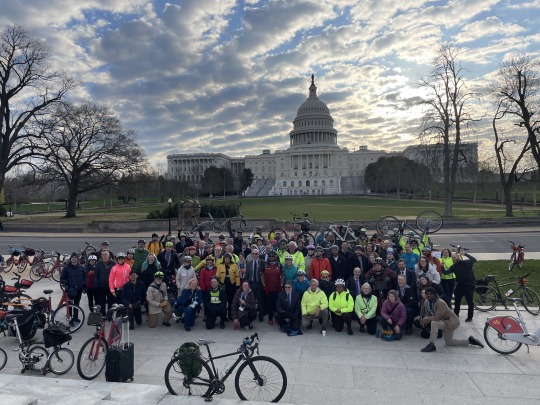
Bikeflights was represented by four Ambassadors, including Tina Beecham, Jessica Brunson and Diana Hildebrand all in person and Kecia McCullough joining virtually.
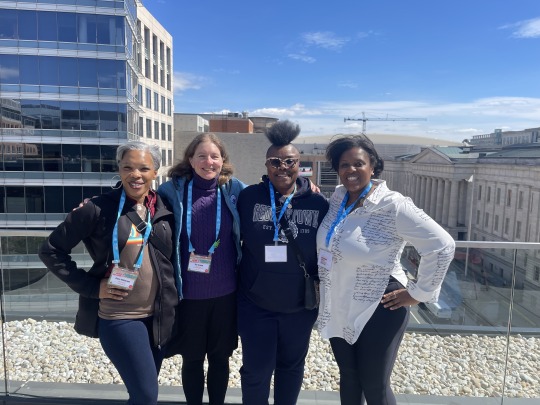
Vice President Sue George also made the trip to the nation’s capital.

Held over three days at the Martin Luther King Jr. Memorial Library and on Capitol Hill, the Summit’s energy was overwhelmingly positive. It turns out that now is a good time for bike advocacy. You can see it by simply riding around Washington, DC, where like many other parts of the country, there are increasingly more protected bike lanes, dedicated trails and paths and many other infrastructure improvements that have been proven to increase rider safety, like rumble strips and better lighting and signage.
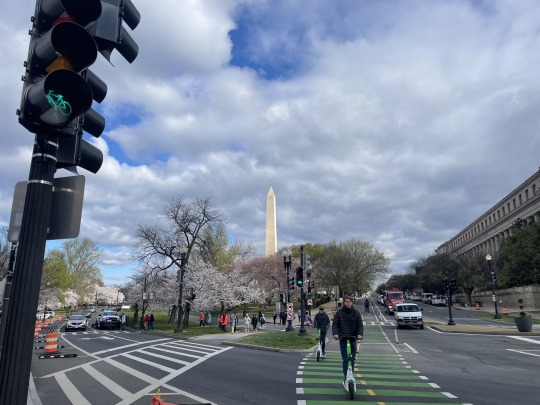
And the momentum continues with recent infrastructure bills promising more funding to come to states and localities everywhere. Of course, there’s still plenty more work to be done. We were all reminded of a sobering statistic: there’s been a 55% increase in cycling fatalities in the US in the past 10 years.
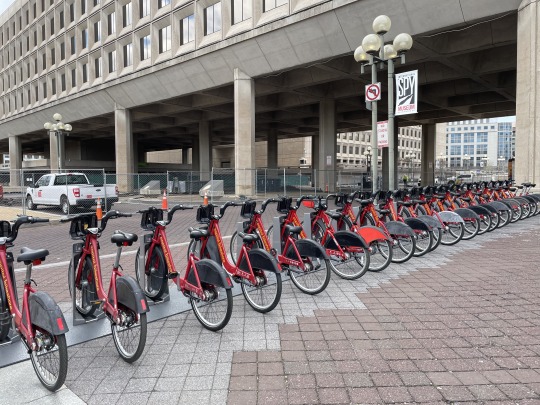
On opening day, we especially enjoyed the presentation by Veronica O. Davis, author of “Inclusive Transportation: A Manifesto for Repairing Divided Communities.” Davis believes everyone should have access to safe, reliable and affordable transportation, and she shared some of her first-hand experiences creating more such opportunities while working for the City of Houston as the Director of Transportation & Drainage Operations. Davis painted a candid picture of what it’s really like to be on the administrative side of bike advocacy, something useful for bike advocates to better understand as they work with other administrators in similar situations.

Perhaps the most entertaining speaker was Shailen Bhatt, Administrator of the Federal Highway Administration (FHWA). With his witty sense of humor, Bhatt made us laugh, even while sharing info about The Active Transportation Infrastructure & Investment Program (ATIIP) and how the FHWA encourages the implementation of projects and programs to improve safety, equity and accessibility for all road users, especially through Complete Streets Planning.
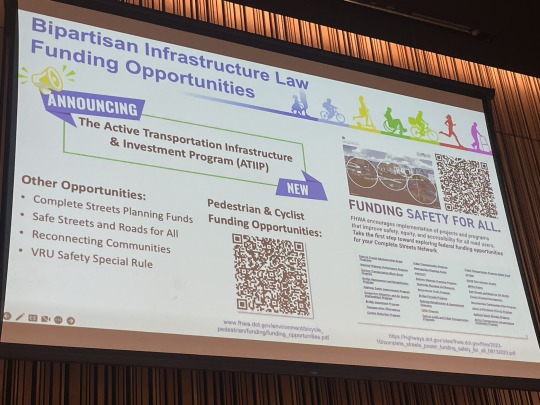
Another big highlight was getting to see our very own Bikeflights Ambassador Diane Hildebrand receive an award upon being named “Educator of the Year” by the League of American Bicyclists. Congratulations to Diane!
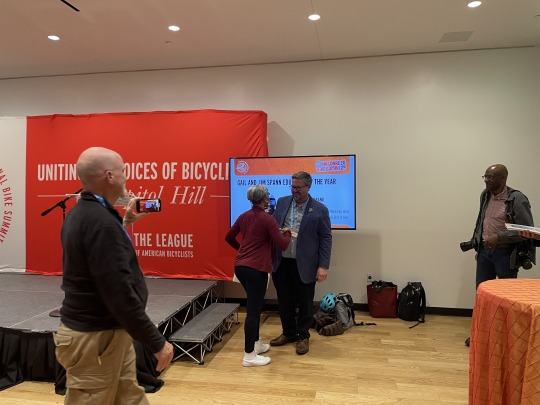
The second – or middle day – of the Summit was what is called “Lobby Day.” That’s when Summit attendees swap out their bike shoes and helmets for business attire and meet with their respective Senators and Representatives or their staff to advocate for bills and initiatives that will create a more bicycling-friendly America.
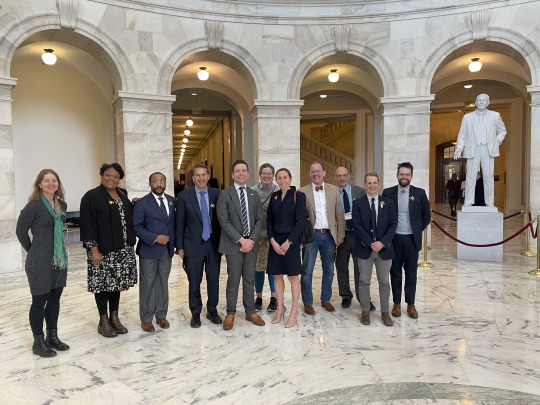
As we rode bikes and walked around Washington, we were treated to the sight of blooming cherry blossoms around the Tidal Basin and everywhere. Mother Nature may have brought peak bloom a week or two prematurely this year, but her timing worked out to be perfect for us to enjoy.
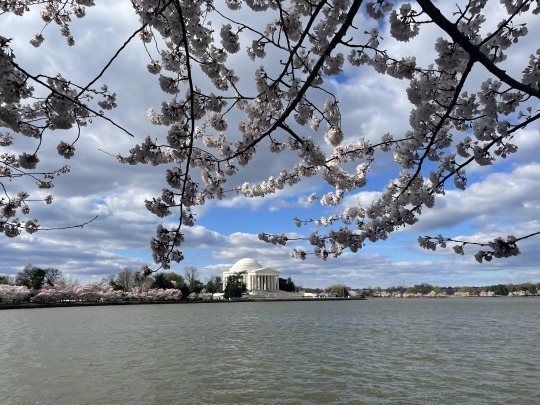
Our big takeaway from this year’s National Bike Summit is that the most important thing is to simply show up. Again and again. We were reminded by retiring Oregon Senator Earl Blumenauer and Washington Area Bicyclist Association Advocacy Director Jeremiah Lowery that nothing ever happens to make cycling better and safer if no one shows up.
So while not everyone can take the time or afford the expense of traveling to Washington to lobby their members of Congress for bills that fund cycling infrastructure improvements, there’s a lot we can all do locally… such as filling out surveys to give rider input about proposed local transportation projects, attending your city or county meetings and getting involved in your local advocacy group.

Bikeflights is proud to be a long-time sponsor of the League of American Bicyclists National Bike Summit.
3 notes
·
View notes
Text
A group of bipartisan lawmakers reintroduced the Secure and Fair Enforcement (SAFE) Banking Act in the House and Senate on Wednesday, after the legislation designed to free up banking services for the cannabis industry stalled in last year's Congress.
The bill, which has been tweaked since last session, was introduced by Sen. Jeff Merkley, D-Ore., Sen. Steve Daines, R-Mont., Rep. Dave Joyce, R-Ohio, and Rep. Earl Blumenauer, D-Ore.
If the critical banking and financial protections advance through committees, they could see a vote on the Senate floor for the first time. The bill, which has always had strong bipartisan support, passed in the House seven times previously.
"For the first time, we have a path for SAFE Banking to move through the Senate Banking Committee and get a vote on the floor of the Senate," Merkley said in a statement. "Let's make 2023 the year that we get this bill signed into law so we can ensure that all legal cannabis businesses have access to the financial services they need to help keep their employees, their businesses, and their communities safe."
Senate Majority Leader Chuck Schumer, D-N.Y., expressed his support for the legislation on Thursday and said he would work to make sure the legislation includes criminal justice provisions when it reaches the floor.
Cannabis stocks Curaleaf Holdings, Trulieve Cannabis Corp, and Terrascend Corp all rose by double-digit percentages on Thursday. The bipartisan nature of the SAFE Banking Act's reintroduction appeared to boost hopes of more relief to come in the industry.
"The SAFE Banking Act will provide urgently needed relief to cannabis businesses of all sizes and act as a stepping stone to broader reforms," said Matt Darin, CEO of multistate cannabis operator Curaleaf, in a statement after the bill's reintroduction.
Under current federal law, banks and credit unions face federal prosecution and penalties if they provide services to legal cannabis businesses because cannabis is still a Schedule I substance, the same classification as heroin and LSD. Schedule I substances are defined as drugs with no currently accepted medical use and a high potential for abuse, according to the federal Drug Enforcement Administration.
Without access to financial services, state legal cannabis businesses are forced to operate their businesses solely using cash, which can result in robbery, money laundering, and organized crime.
"This legislation will save lives and livelihoods. It is past time that Congress addresses the irrational, unfair, and unsafe prohibition of basic banking services to state-legal cannabis businesses," said Blumenauer, founder and co-chair of the Congressional Cannabis Caucus.
Key components of the bill protect banks that work with state-legal cannabis businesses from being penalized by federal regulators.
Under SAFE Banking, federal regulators are barred from taking several punitive steps against banks, according to the legislation:
• Prohibit, penalize or discourage a bank from providing financial services to legal cannabis businesses
• End or limit a bank's federal deposit insurance if the bank provides those services
• Recommend or incentivize a bank to halt or downgrade providing banking services to cannabis businesses
• Take any action on a loan to an owner or operator of a cannabis business
The legislation also creates a safe harbor from criminal prosecution, liability and asset forfeiture for banks, their officers or employees. Moreover, a new component includes the safe harbor statute extended for underserved communities who face challenges in accessing capital and provide affordable access to financial services.
EXECUTIVES SOUND OFF
SAFE Banking, which has 38 additional cosponsors in the Senate and eight additional cosponsors in the House, will be a boon for an industry that has seen a downturn. Top cannabis executives have pushed Congress for years to take action on banking and other federal reforms needed to fortify their businesses.
Brady Cobb, the CEO of Sunburn Cannabis, a leading Florida dispensary chain, said in a statement, "All eyes should be on the Senate Banking Committee to call the measure up for its first hearing in the Senate."
"SAFE will serve as a springboard for the US banking and financial sectors to meaningfully participate in this budding industry, and most importantly it will significantly reduce the safety risks faced by the thousands of employees of this all cash business," he said.
Morgan Paxhia, co-founder and managing director at Poseidon, a cannabis investment firm, called the measure's reintroduction a major advancement for the industry.
"We have seen many firsts in legal cannabis and that now includes the scheduling of a hearing of cannabis banking reform in the Senate," added Paxhia. "This is an historic step for the Senate."
#us politics#news#cnbc#2023#us senate#Secure and Fair Enforcement Banking Act#SAFE Banking Act#marijuana#cannabis#sen. Jeff Merkley#sen. steve daines#Rep. Dave Joyce#Rep. Earl Blumenauer#Senate Banking Committee#sen. chuck schumer#Curaleaf Holdings#Trulieve Cannabis Corp#Terrascend Corp#Matt Darin#drug enforcement agency#Congressional Cannabis Caucus#Brady Cobb#Sunburn Cannabis#Morgan Paxhia#Poseidon
7 notes
·
View notes
Text
A Democrat’s obsessive quest to change the way America is farmed and fed
Each year for the last 26 years – nearly his entire tenure in the US Congress – Earl Blumenauer has advocated for a law that would utterly transform US agriculture.
Nearly every time, though, his proposals have been shut down. Even so, he persists.
Blumenauer, a Democrat from Oregon, wants to see a version of US agriculture that centers people, animals and the environment, rather than the large-scale, energy-intensive commodity crop farms that currently receive billions of dollars in subsidies. In effect, he has a completely different vision for how 40% of the country’s land looks and works.
8 notes
·
View notes
Text
Federal regulators are being pushed to investigate whether Elon Musk deceived investors in his brain-chip startup Neuralink by omitting details about the gruesome deaths of at least a dozen animals who were surgically fitted with its implants.
Four members of the US House of Representatives today alleged that Musk issued false statements in September regarding the deaths of 12 macaque monkeys, the subjects of experiments at a primate center in California between 2018 and 2020, according to a letter obtained by WIRED.
The lawmakers have urged Gary Gensler, head of the Securities and Exchange Commission (SEC), to initiate a probe into whether Musk committed securities fraud by glossing over the lethal aspects of Neuralink’s tests—a potential violation, they claim, of an SEC rule designed to shield investors from material omissions and misstatements linked with the purchase or sale of a security.
Musk, in September, claimed in a post on X (formerly Twitter) that no animal test subjects died as "a result of a Neuralink implant,” adding that the company strove early on to “minimize risk to healthy monkeys,” choosing only those who were “close to death already.”
“Mr. Musk knows this statement is false,” the lawmakers told Gensler, a former Goldman Sachs investment banker turned Wall Street sheriff.
The lawmakers’ push to see Musk investigated is spearheaded by US representative Earl Blumenauer from Oregon. As of Wednesday, three additional Democrats had joined the effort, including Barbara Lee, James McGovern, and Tony Cárdenas.
A WIRED investigation this year shed serious doubt on Musk’s animal welfare claims, finding that several macaque monkeys who’d been experimented on suffered greatly before their deaths, anguish that was prolonged in some cases to help Neuralink gather data following its surgeries. Veterinary records obtained by WIRED show many of the fatalities resulted directly from surgical complications linked by employees of the California National Primate Research Center to the implant procedure.
A former employee told WIRED this year that Neuralink's animal test subjects could not have been "close to death,” as Musk had claimed. The animals routinely underwent years of training in advance of the procedure, they said. In one experiment, a piece of a Neuralink device “broke off” during implantation, an autopsy report says, causing a fungal infection. In another, a Neuralink implant left a portion of a monkey’s cerebral cortex “focally tattered.”
“The idea that these were terminal monkeys is ridiculous,” a former Neuralink employee told WIRED. “We had these monkeys for a year or so before any surgery was performed.” (Neuralink did not respond to WIRED's request for comment at the time.)
The lawmakers’ letter to the SEC claims the animals’ deaths are directly related to the safety and marketability of Neuralink’s brain-computer interface. It is critical, they say, that investors in the company be provided with accurate information. The minimum investment accepted by outside parties is $14,995, SEC filings show.
Neither Musk nor Neuralink responded this week to inquiries concerning Musk's claims. A spokesperson for the University of California, Davis, overseer of the primate center where Neuralink’s experiments were conducted, declined to comment.
Reportedly valued at around $5 billion, Neuralink raised more than $280 million, according to filings, during a recent funding round this year. “Given the scale of these investments and Mr. Musk’s history of misleading investors,” the lawmakers write, “it is crucial that the SEC investigate whether Mr. Musk’s September 10, 2023 post violated [Rule 10b-5].”
The rule, which authorizes the SEC to regulate securities fraud, was affirmed by the Supreme Court as recently as 2014 in a case against Halliburton, one of the nation's largest oil service companies. It relies on a theory known as "fraud on the market," stipulating a causal link between a company’s value and the integrity of public information regarding its activities.
Blumenauer, who cochairs the Congressional Animal Protection Caucus, characterized the brain-computer startup as having a “distressing history of alleged animal welfare abuses,” saying the SEC investigation should determine whether Musk intentionally misled the public by “misrepresenting the harm caused by botched animal trials.”
“When dealing with alleged animal welfare violations as egregious as those leveled against Musk, there needs to be greater urgency to hold him accountable,” he told WIRED in a statement.
Musk has previously faced investigations for allegedly misleading investors. In 2018, the SEC charged him with securities fraud over a series of false tweets regarding a potential push to take Tesla private. In a settlement, Musk was forced to step aside as chairman for three years and personally pay a $20 million fine, with Tesla fined an additional $20 million. As a condition of the settlement, Musk neither admitted nor denied the allegations.
In an unrelated case, the SEC urged a federal judge last week to compel Musk to testify as part of a probe into his $44 billion takeover of Twitter.
In May, the US Food and Drug Administration issued approval for Neuralink to begin human trials, having previously rejected the company’s application over safety concerns. Reuters reported that those concerns centered largely around whether the electrodes connected to the Neuralink device were prone to detaching and moving freely around after being connected to a subject’s brain.
In a report this month, Bloomberg News claimed that thousands of people have expressed interest in obtaining an implant from Neuralink, a device that Musk once famously described as a “Fitbit in your skull.” The procedure will involve removing a coin-sized piece of the subject’s cranium and allowing a proprietary robot to weave superthin wires into their brain.
Read the full letter below:
The Honorable Gary Gensler
Chair
U.S. Securities and Exchange Commission
100 F St. NE
Washington, DC 20549
Dear Chair Gensler:
Thank you for your ongoing work to protect investors and safeguard the integrity of our financial system. We write to request that the Securities and Exchange Commission (SEC) investigate whether Elon Musk, Chief Executive Officer of the medical device company Neuralink (Central Index Key # 0001708503), committed securities fraud by making intentionally misleading statements to investors.
Since 2016, Neuralink has conducted experiments on animals with the intention of developing an implantable brain-computer interface. Between May 2017 and December 2020, employees performed invasive, exploratory brain studies on rhesus macaques at the University of California, Davis (UC Davis). During most of the experiments, Neuralink employees drilled two dime-sized holes in the animals’ heads, implanted electrodes in their brains, and attached titanium plates to their skulls using bone screws.
In 2021, as a result of a California Public Records Act lawsuit against UC Davis, the Physicians Committee for Responsible Medicine obtained veterinary records from Neuralink’s experiments that show that the implantation of the Neuralink device caused debilitating health effects in the monkeys. Test monkeys suffered from chronic infections, swelling in the brain, “remnant electrode threads” from the device, a “tattered” cerebral cortex, paralysis, seizures, loss of coordination and balance, and depression. Public records reveal that at least 12 young, previously healthy monkeys were euthanized by Neuralink as a direct result of problems with the company’s implant.
On September 10, 2023, Mr. Musk responded to animal welfare concerns at Neuralink via a post on the social media platform X, which he also owns. He wrote:
“No monkey has died as a result of a Neuralink implant. First our early implants, to minimize risk to healthy monkeys, we chose terminal mon[k]eys (close to death already)[.]”
Yet Mr. Musk knows this statement is false. Monkey health records show that, while several animals had suffered physical trauma and been used previously in experiments at UC Davis, there is no evidence that they were “close to death,” as Mr. Musk stated. Rhesus macaques often live to about 25 years in captivity, with some living to 40. But the average age of the 12 monkeys euthanized by Neuralink was 7.25 years when they were moved to the company’s experimental protocol.
The animals’ deaths and the reasons for their deaths relate directly to the safety and marketability of Neuralink’s brain-computer interface. It is critical that the company provide investors with factually accurate information, and thus we are concerned that Mr. Musk may have violated SEC Rule § 240.10b-5:
It shall be unlawful for any person, directly or indirectly, by the use of any means or instrumentality of interstate commerce, or of the mails or of any facility of any national securities exchange...[t]o make any untrue statement of a material fact or to omit to state a material fact necessary in order to make the statements made, in the light of the circumstances under which they were made, not misleading...in connection with the purchase or sale of any security.
In its 2018 complaint against Mr. Musk for posting misleading messages on the platform then known as Twitter, the SEC referenced his 22 million followers, emphasizing the reach of his social media account: “His tweets were published instantaneously to those people and were also publicly available to anyone with Internet access.”
Mr. Musk’s online reach has grown significantly since 2018. Today, he has 162.9 million followers on X, the most of any account on the platform, and his September 10 post has already received more than 788,000 views.
The company claims to have raised $280,274,981 in investments, with a minimum investment accepted from any outside investor of $14,995, according to its August 2023 Form D notice. Given the scale of these investments and Mr. Musk’s history of misleading investors, it is crucial that the SEC investigate whether Mr. Musk’s September 10, 2023 post violated SEC Rule § 240.10b-5.
Thank you for considering this request.
3 notes
·
View notes
